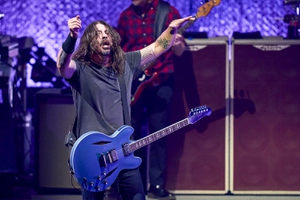
Bruce Springsteen The Ties That Bind: The River Collection
As with many things Bruce Springsteen, “The Ties That Bind” has multiple meanings. It’s the opening track to The River, announcing the theme of that 1980 double-album. It was the name of the same record when Springsteen first turned it in to his label, as a single album, before taking it back and making it a double-LP, because he felt it needed more. And it’s the name of the new box set focused on The River era, giving fans more insight into that important period.
“The ties that bind” is also a pretty perfect way to describe where The River falls in the Springsteen canon—chronologically, musically and from a storytelling standpoint. Springsteen creates worlds on his albums and fills them with characters often striving for similar things in similar places. Born to Run (1975): desperate for something more in your 20s (“It’s a town for the losers, and I’m pulling out of here to win”). Darkness on the Edge of Town (1978): what happens after those dreams die (“Keep pushing till it’s understood, and those badlands start treating us good”). And The River: starting your real life—family, work, finding your place (“Now you can’t walk away from the price you pay”).
These are characters forced to deal with broken relationships, as on “Independence Day” (“We wouldn’t change this even if we could somehow”), broken hearts, as on “Point Blank” (“Did you forget how to love girl, did you forget how to fight?”) and broken lives, as on “The River” (“Is a dream a lie if it don’t come true, or is it something worse?”).
In The Ties That Bind documentary, Springsteen says these ballads—along with other gems like “Drive All Night” and “Wreck on the Highway”—make up the spine of the double album. The rest of it is filled with fast rockers that set out to re-establish the E Street Band as the best bar band in the world. Big saxophone solos from Clarence Clemons. Beautiful organ from Danny Federici. And the dirty garage feel of Steven Van Zandt’s pop construction and backing voice. These songs are fun on record but become real monsters in the live show. The summer party that is “Sherry Darling.” The full band assault of “Ramrod.” The crowd call-and-response of “Cadillac Ranch.”
As with any Springsteen album, once you dig deeper, you get more amazed. The band cut 104 demos and recorded 53 songs in the studio before Springsteen whittled The River down to its final 20-song set. That means some of his best were left out. Off the original version of the album, Ties, those include “Loose End,” one of Springsteen’s most emotionally compact stories of love gone wrong (“How could something so bad, darling/Come from something that was so good”); “Be True,” a tight pop tune and could-have-been single; and the murky “Chain Lightning,” which feels like an odd ’60s dance-rock number.
Among 22 outtakes, half have never been released. The others can be found in various forms on box sets like Tracks, including favorites like “Roulette” (which Springsteen has said should have made The River’s final cut), the wild and loose “Restless Nights,” and “I Wanna Be With You,” which seems made for rock radio.
The unreleased batch is loaded with even more hit potential. “Meet Me in the City” is a prototypical fist-pumping Springsteen show-opener. “Little White Lies” is speedy and intense, a nod to the Boss’ camaraderie with punk music. The cinematic “The Time That Never Was” nods to Phil Spector’s influence on Springsteen’s early work. And “Stray Bullet” is a stunning ballad that ranks with the best ballads of this or any other Springsteen era.
Every time Springsteen releases a treasure trove like this, we wonder how he could leave so many jewels in the vault for so long. What if “Lonely Night in the Park” had made it onto Born to Run? Where would “The Promise” have fit in the world of Darkness? Would “Where The Bands Are” or “Party Lights” have climbed the charts like “Hungry Heart” during The River years?
But that’s what Springsteen has always done. He’s not about creating the most hits; he’s about creating the best album. He’s always been striving for something greater. And that’s why The River, like so many other Bruce Springsteen albums, feels as vital now as it did then.







